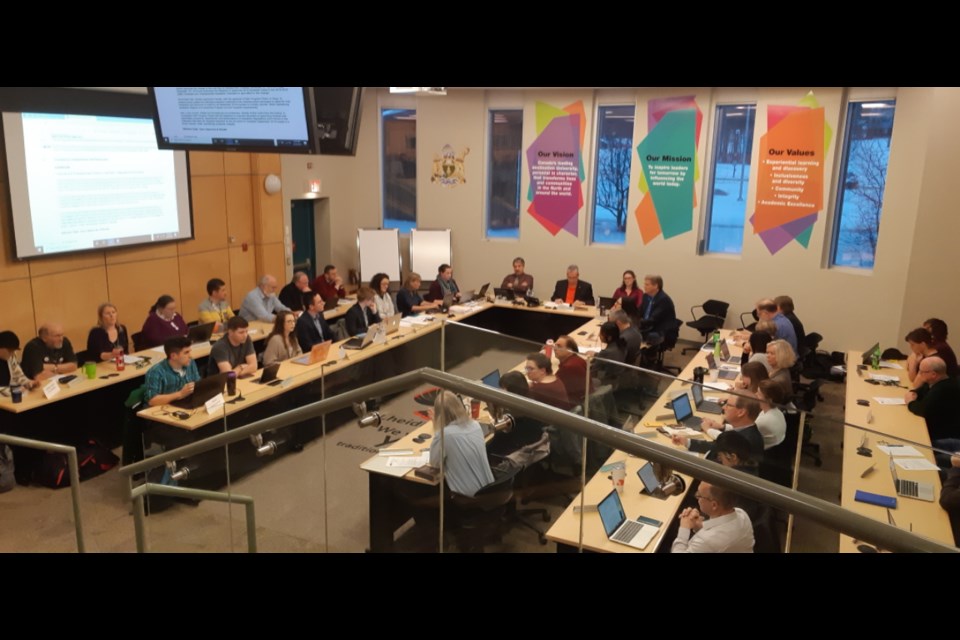In the wake of a faculty strike which shut down classrooms for three weeks, students at UNBC will have another 10 instructional days added to the current semester and will not be writing final exams to complete their course requirements.
The decision was made Monday afternoon at a special meeting of the UNBC senate and the motion to extend the semester and conclude classes on Dec. 13 was passed unanimously.
“This seemed to be the most appropriate course of action,” said student senate representative Steven Horianopoulos.
“Other possibilities, such as going into January, were really unfeasible when you consider the mental health of students and international students’ programs that can’t afford to do that. This is the only real option and of course it’s tough because we’re going to be losing some days of instructional time.”
Students were concerned that a semester extending into January were worried about having already lost three weeks due to the strike, another break over Christmas would impact their retention of course material for final exams.
“We all go into a semester preparing for final exams and now it’s a different beast and we’ll have to tackle it and I trust that the professors at the university will have our thoughts in mind,” said Horianopoulos, a fourth-year biology major.
“I don’t think anyone’s happy. It was said multiple times by Senator (David) Casperson, there is no solution, there is no fixing. It’s mitigating damage. Everyone’s been damaged by this. In the end, this is the best we can do for now.”
On the student calendar, Tuesday was supposed to be the final day of classes.
While the senate recognized the extended semester will adversely affect some students who have already made travel plans or face the expiration of their student visas, faculty members were advised there will be some flexibility granted to students with special circumstances and program chairs and deans will have the full support of administration to find solutions. In same cases, foreign students will have the opportunity to finish their courses at other universities which have working relationships with UNBC.
“This has been an outstanding balancing act between where we are with all the students with all the different programs and all the different requirements and I’m quite pleased with that,” said UNBC provost Dan Ryan. “At the end of the day the faculty have the flexibility to do what they need in order to help complete the programs.”
Environmental science professor Peter Jackson said some student assignments require time-consuming evaluations and raised concerns at the senate meeting over a requirement that students have their final grades released within three days after the final day of classes, Dec. 13. The time crunch for instructors could be further impacted by teaching assistants having already left the city at the expiration of their contracts.
“The challenge is sometimes when you have major papers to mark they may take half an hour to an hour each and if you have a hundred of them and don’t have TA support it’s very difficult to fit that in,” said Jackson. “Instructors need flexibility to do a proper evaluation and I’m confident they’ve allowed flexibility to address the changing situation.”
The senate also indicated there’s a real possibility student evaluations of their instructors will be cancelled, with more discussions on that topic upcoming.
There is still no agreement between the faculty association and administration. After a week of talks with provincial mediator Trevor Sones, faculty agreed on Friday to take down picket lines and classes resumed on Monday. The faculty has filed a complaint over their concerns administration was not bargaining in good faith.
Talks are expected to resume this week and UNBC president Daniel Weeks is hopeful a settlement will be reached well in advance of the Christmas break.
“Our faculty do have legitimate concerns and we’re doing our very best to work with not only them but our province and our board to make sure that we’re able to support their needs and demands,” said Weeks.
“We’re still waiting to hear from the mediator with respect to his conclusions and his suggestions about how to move forward. I expect we’ll hear from him in the next few days for sure. He indicated he would be reaching out to both sides to let us know what he’s thinking and hopefully suggest some productive ways to move forward.”



